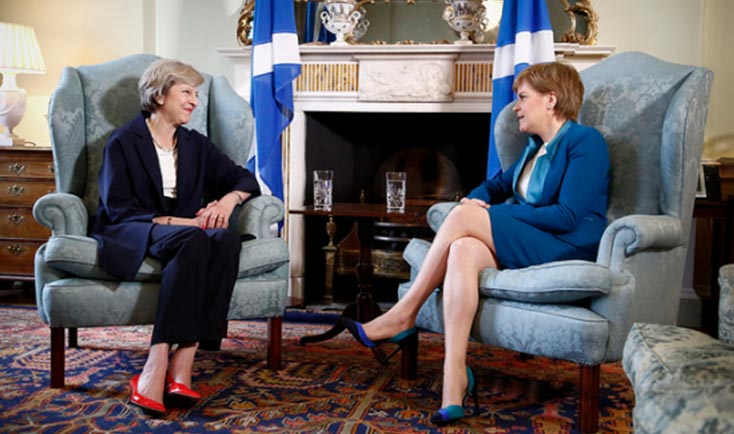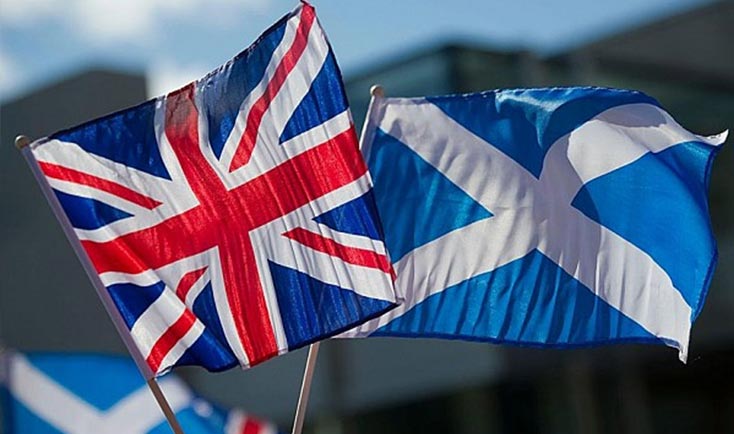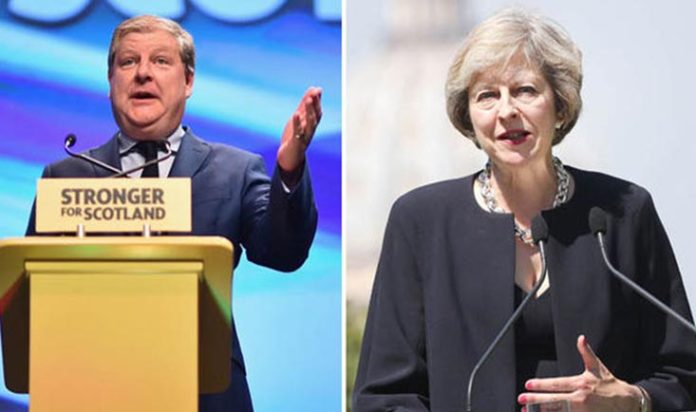Scottish National Party has warned UK’s PM Theresa May not to interfere in the second Scottish independence referendum.
Deputy Leader Angus Robertson shared similar views on the matter, saying he did not want to
“sit in the back of the Tory Brexit bus… and see the prime minister drive us off a Brexit cliff”.
The UK’s PM, Theresa May has not shared her intentions as to how will she deal with this issue. Nicola Sturgeon plans for a second Scottish independence referendum. She wants the referendum to take place between Autumn 2018 and Spring 2019.
Section 30 Order for Scottish Independence Referendum
The Scottish Parliament needs to vote before the timing of the formal negotiations can be decided. The Scottish government will ask the UK government to grant it Section 30 Order.
If the UK government grants Section 30 Order, it will make the results of the Scottish Independence Referendum legally binding upon the UK government.
Theresa May’s reply to Nicola Sturgeon
 Here is what UK’s PM had to respond to Nicola Sturgeon’s proposal to hold second Scottish independence referendum.
Here is what UK’s PM had to respond to Nicola Sturgeon’s proposal to hold second Scottish independence referendum.
“As we negotiate to leave the EU, I want to negotiate an agreement which is going to work for the whole of the United Kingdom that includes the Scottish people. That’s why we have been working closely with the devolved administration. We have been listening to their proposals and recognizing the many areas of common ground that we have such as protecting workers’ rights and our security from crime and terrorism.”
“The tunnel vision that the SNP has shown today is deeply regrettable. It sets Scotland on a course for more uncertainty, and division, creating huge uncertainty and this is the time when the evidence is that the Scottish people, majority of them do not want a second Independence Referendum. So, instead of playing politics with the future of our country, the Scottish Government should focus on delivering good government and public services for the people of Scotland. Politics is not a game.”
Results of First Scottish Independence Referendum
The first Scottish Independence Referendum held in 1997 was a close contest between a Yes and a No. Around 44.7% Scottish people wanted Scotland to become an independent country and 55.3% wanted to remain in the UK.
Why Scottish Independence Referendum?
 The Scottish people want to remain in the EU while after the Brexit, UK is on its path to get out of the European Union. People in the Scotland want to stay in the European Union, unlike the UK. The Scottish people cannot currently choose to remain within or leave the EU on their own; they are dependent on the UK for that decision.
The Scottish people want to remain in the EU while after the Brexit, UK is on its path to get out of the European Union. People in the Scotland want to stay in the European Union, unlike the UK. The Scottish people cannot currently choose to remain within or leave the EU on their own; they are dependent on the UK for that decision.
Other reasons why Scotland might want to consider remaining with the UK.
Economic Benefits
A significant number of jobs in Scotland are supported due to exports to the EU, amounting to an estimated 13% of the entire Scottish workforce.
EU countries stand for 42% of all the exports made by Scotland as of the year 2014.
The contribution made by each Scottish household is a lot less than the total benefits each Scottish household attains from the European Union.
International Trade
EU Membership gives Scotland access to several other countries via bilateral trade agreements. These deals help Scotland get preferential treatment and mostly free access to the different markets. Scotland can reap benefits of EU’s trade agreements with over 50 countries and more to be added soon to that list including Canada.
Funding from EU
Here is the list of funding received by Scotland from the European Union.
- European Regional and Social Funding of €985 million, equally matched by the Scottish Government.
- Funds of around €844 million allocated by the EU for Scotland’s Agricultural Fund for Rural Development and Scottish Government. Scotland has classified 95% of its land as rural (for 2014 to 2020).
- European Agricultural Guarantee Fund will give €3.5 billion (for 2014 to 2020) to help farmers not producing food but also protect the environment, improve animal welfare, and sustain local communities.
- A total of €572 million was allocated for Scottish Universities (between 2007 and 2014) which enhanced the quality of research, contributed towards economic development and facilitated completion of many research projects started by Scottish Academicians.
Security of the Country
Scotland, like any other country, faces several global challenges like climate change, terrorism, organized crime, international trade, and rogue states. Scottish Government asserts that by gaining independence and remaining in the EU, it could do more to protect its national interests, than by staying in the UK and leaving the EU.


